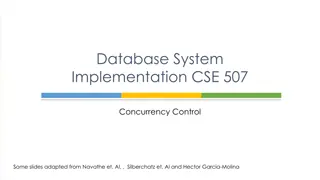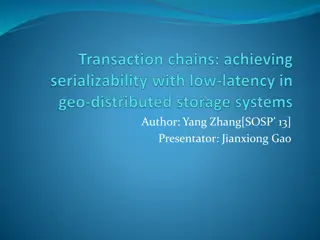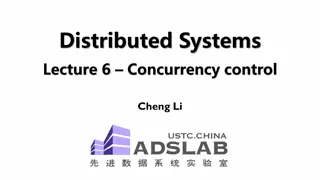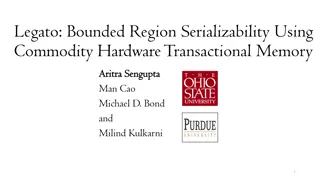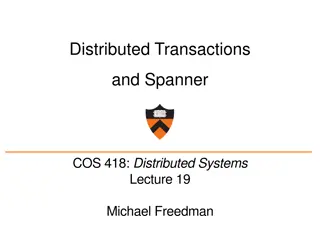Understanding Lock-Based Protocols in Database Concurrency Control
Lock-based protocols are essential mechanisms for controlling concurrent access to data items in a database system. This involves granting locks in exclusive (X) or shared (S) modes to ensure data integrity and prevent conflicts. Lock compatibility matrices and locking protocols play a crucial role
2 views • 69 slides
Distributed Database Management and Transactions Overview
Explore the world of distributed database management and transactions with a focus on topics such as geo-distributed nature, replication, isolation among transactions, transaction recovery, and low-latency maintenance. Understand concepts like serializability, hops, and sequence number vectors in ma
0 views • 17 slides
Understanding Database Transactions and Concurrency Control
This content delves into the world of database transactions, exploring concepts such as ACID properties, locking schedulers, anomalies in scheduling, and implementing transaction control mechanisms like Two Phase Locking. It covers the importance of maintaining atomicity, consistency, isolation, and
0 views • 36 slides
Enhancing Concurrency in Distributed Transactions
Explore the challenges and solutions in achieving higher concurrency levels in distributed transactions, focusing on techniques such as optimistic concurrency control and two-phase locking. The importance of maintaining serializability to prevent angry customers and the impact of contention on scala
0 views • 27 slides
Concurrency Control in Distributed Systems: Challenges and Solutions
Delve into the realm of concurrency control in distributed systems, exploring the dual challenges of handling failures and ensuring proper synchronization between multiple transactions. Learn about the complexities of managing shared data, addressing consistency issues, and implementing strategies f
0 views • 46 slides
Memory Models: Enhancing Semantics for Programs with Data Races
This content delves into the importance of establishing stronger memory models to provide better semantics for programs experiencing data races. It highlights the challenges faced due to weak semantics in programming languages like C++ and Java, emphasizing the need for improved memory models to add
0 views • 61 slides
Distributed Transactions and Spanner Overview
Explore concepts like serializability, partitioned data handling, achieving serializability in distributed settings, consensus per transaction group, and insights into Google's Spanner database, focusing on its globally distributed design and fault tolerance mechanisms.
0 views • 24 slides
